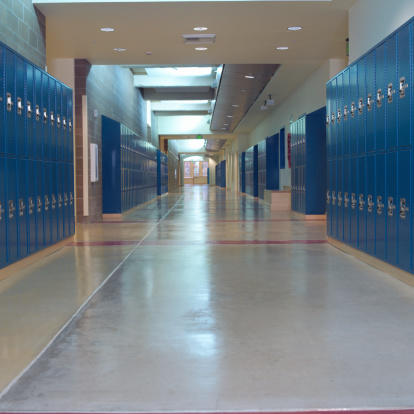Facial recognition has been widely criticized for the risks it poses to vulnerable communities. The technology typically reinforces pre-existing social biases, as seen by its inability to read anyone who isn’t a white man.
It also poses severe privacy risks. Facial recognition makes it easy for government agencies to develop continuous, mass surveillance of vulnerable communities. With all of these risks, it’s not a technology that most people would want to use on kids.
Despite that, Lockport City School District in New York is trying to test a facial and object recognition system called “Aegis.” In September, the district used $1.4 million of the $4.2 million it received in funding through the Smart Schools Bond Act to install the system, Lockport Journal reported.
Superintendent Michelle Bradley announced plans to begin testing the system on June 3. Bradley described the test as an “initial implementation phase.” That means the school wanted to test the system for any necessary adjustments and train district officials on its use. In addition, the test would involve coordinating alert responses with law enforcement.
The district wanted the system operational for the next school year. Those plans were interrupted by the New York State Education Department. Through email, the Department told BuzzFeed News that it is “currently reviewing the Lockport CSD’s privacy assessment to ensure that student data will be protected with the addition of the new technology.”
“The Department has not come to the conclusion that the District has demonstrated the necessary framework is in place to protect the privacy of data subjects and properly secure the data,” the email went on to say.
The American Civil Liberties Union (ACLU) of New York investigated the district’s plans to use facial recognition technology. The ACLU found a lack of community input and noted that the security consultant who encouraged the district to purchase the program seems to be benefitting financially.
Alarmingly there were no clear regulations around how information gathered by the system would be handled. The ACLU found nothing limiting who would have access to the data “collected from the cameras that scan the faces of thousands of parents, teachers, and children every day.”
Over the past few months, facial recognition has grown into a hot political issue. Recently, San Francisco banned local government use of the technology. It was noted that the “propensity for facial recognition technology to endanger civil rights and civil liberties substantially outweighs its purposed benefits.”
Last week, advocates at a hearing before the House Oversight and Reform Committee went so far as to request Congress place a moratorium on facial recognition technology. A reoccurring theme during the hearing was the lack of regulations surrounding the technology which leads to improper use.
New York City’s police department was cited as an example by Clare Garvie, a Senior Associate for Georgetown University’s Center on Privacy & Technology. Garvie’s own report found that the NYPD inserts altered photos (or “garbage data”) into algorithms to force matches.
New York State Assembly Member Monica Wallace has introduced a bill to force Lockport to stop the use of facial recognition while the State Education Department investigates further. However, the state’s assembly session ends in June, so there’s not a lot of time to get the bill through.
It is alarming that Lockport wishes to use facial recognition in schools. Having your biometric data collected is a huge deal. Kids are required to be in school, so they have no way of opting out of the program.
There are researchers and advocates who question whether facial recognition should even exist. If anything, this situation makes that question all the more relevant.

